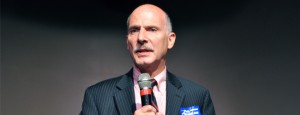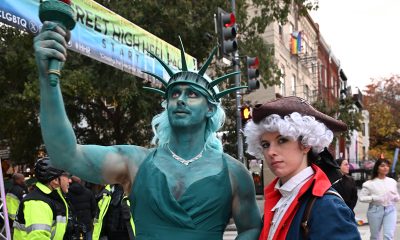Local
Stein Club backs Mendelson
Kwame Brown wins support in Council chairman race

The Gertrude Stein Democratic Club this week endorsed D.C. City Council member Phil Mendelson over his gay challenger, Clark Ray. (Washington Blade photo by Michael Key)
The Gertrude Stein Democratic Club, the city’s largest LGBT political group, voted this week to endorse at-large D.C. City Council member Phil Mendelson over his gay challenger, Clark Ray, 62 percent to 35 percent.
Stein members also on Monday endorsed at-large Council member Kwame Brown in the race for City Council Chairman over his main rival, former Ward 5 Council member Vincent Orange, 80 percent to 16 percent.
The club’s endorsement of Mendelson and Brown for the Sept. 14 Democratic primary followed its decision last month to endorse City Council Chairman Vincent Gray over Mayor Adrian Fenty in the hotly contested mayoral race.
Mendelson, whose gay supporters portrayed him as an unfailing straight ally who shepherded the city’s same-sex marriage law through the Council last year, received just two points above the 60 percent threshold required for an endorsement under the club’s rules.
Monday’s endorsements came after the candidates spoke during a club forum at the gay nightclub Town, and members debated whom to back. About 100 members voted on the endorsements, according to Stein Club President Jeffrey Richardson.
A third candidate running in the at-large Council race, D.C. shadow senator Michael Brown, did not receive any votes from Stein members, although he received loud applause for what he said was the main mission of his candidacy: to promote D.C. statehood.
Michael Brown expressed strong support for the city’s same-sex marriage law and pledged to be a “champion” for LGBT rights if elected to the at-large Council seat.
During the forum, several Mendelson supporters praised Ray as a highly qualified candidate. But they said it would be wrong not to stand behind Mendelson, a pro-LGBT Council member who has a record of support on a wide range of LGBT issues such as same-sex marriage equality, gay adoptions and domestic partnership laws during his nearly 12 years on the Council.
“Here in the District of Columbia, we have more rights as members of the LGBT community than we do in other states,” said transgender activist Jeri Hughes. “And it’s due to legislation from men like Phil Mendelson. So no matter how much I love Clark Ray, I’m not going to forget what Phil Mendelson has done and the progress that has been made in the District. I’m supporting Phil Mendelson.”
Ray, who also praised Mendelson for his role in helping pass the local same-sex marriage law, said he was running to bring change to a Council “status quo” that has impeded progress for city residents.
“I’m a firm believer that for a city to breathe and move forward, you need fresh leadership,” he said.
Ray pointed to his many years of experience in public service, including his work for Vice President Al Gore in the Clinton administration, his role as head of the constituent services office under former D.C. Mayor Anthony Williams and a similar post under Mayor Adrian Fenty. Ray also served as director of the Department of Parks & Recreation under Fenty.
“I have not asked any one of you to vote for me because I’m an openly gay man,” Ray told Stein Club members. “I want you to vote for me because I’m qualified.”
But Ray and his supporters also stressed that as an openly gay man, he would provide the LGBT community with another “seat at the table” in city government, where he would have a greater understanding of the needs and concerns of LGBT people.
“I’m not only a friend of the LGBT community, I am a member of that community,” he said.
If Ray wins the election, he would become the third openly gay person on the 13-member City Council. Gay Council members David Catania (I-At Large) and Jim Graham (D-Ward 1), who are running this year for re-election, are considered strong favorites to win another term on the Council.
Among the club members who spoke on Ray’s behalf at the Stein forum were Nick McCoy and Carlene Cheatam, two of the lead organizers of a coalition of local activists and city residents who lobbied the Council to pass the same-sex marriage law.
Among the club members supporting a Mendelson endorsement were lesbian activist Barbara Helmick and nationally recognized gay rights attorney Nancy Polikoff.
Polikoff told club members that while Mendelson’s work on the same-sex marriage law captured most of the community’s attention, he introduced and played a key role in passing a gay adoption law that is considered the most far-reaching such measure in the country.
“None of this would have happened without Phil,” she said.
Mendelson said after Stein Club members voted that he was honored to have won the club’s endorsement and he would continue his commitment to LGBT rights and causes.
During a question and answer period, one written question directed at Ray asked whether he would consider running for the other at-large Council seat that would become vacant if Kwame Brown wins his race for Council chairman.
Under the city’s election rules, the D.C. Democratic State Committee would appoint Kwame Brown’s interim replacement until a special election is held several months later. Ray said he’s running to win in his race against Mendelson but added that he would view a Council vacancy created by Kwame Brown’s possible election as Council chairman as a development “of interest” to him.
Several club members supporting Mendelson said they would back Ray for an at-large seat vacated by Brown.
Orange addresses flip
on same-sex marriage
In his opening remarks at the Stein forum, Orange addressed an issue he seemed to know would hurt him in his quest for the club’s endorsement: his stated opposition to same-sex marriage during his unsuccessful mayoral bid in 2006.
In a development that riled LGBT activists, Orange said then that any of his fellow candidates for mayor who backed a proposed same-sex marriage bill were not fit to hold public office.
“In 2006, I did say marriage was for a man and a woman,” he told Stein members Monday. “Now, in 2010, I strongly support the Marriage Equality Act.”
Orange added that he had a long record of support on LGBT civil rights issues during his tenure as a Ward 5 Council member and later in his post as an executive with the Potomac Electric Power Company, where he said he pushed for a company policy of providing benefits to employees’ domestic partners.
When gay activist Lane Hudson, a Kwame Brown supporter, questioned Orange’s commitment to same-sex marriage, Orange reiterated his support for the same-sex marriage law, calling it the “law of the land.”
“I made some mistakes that I’m not proud of,” he said, referring to his 2006 comment. Orange said he changed his position to support marriage equality “long before” he decided to enter the Council chairman’s race.
Kwame Brown was among the 11 Council members who voted for the same-sex marriage bill in December. He told Stein members he’s strongly committed to LGBT equality in all areas, not just marriage.
He noted that his commitment to same-sex marriage is “unwavering,” despite expressions of outrage against his vote on the marriage bill by some community activists and clergy members who opposed the bill.
In response to an audience question, Kwame Brown said he opposes a ballot measure proposed by same-sex marriage opponents that would allow city voters to decide whether to keep or overturn the law.
Orange said he supports the marriage law but did not say, after repeated requests to comment on the matter, what his position is on a possible ballot measure to overturn the marriage law.
“I’m not going to speculate on hypotheticals,” he said.
Ray told the Blade he was disappointed but not discouraged over the Stein Club’s decision to endorse Mendelson.
“This is not going to hinder me at all,” Ray said. “I’m in this thing for the long haul and I’m in this to win. I plan to take my message to all residents — gay, lesbian, bisexual, transgender, straight, questioning — all the residents of the District of Columbia.”
Although Michael Brown, the D.C. shadow senator, received no votes from Stein Club members in his bid for the at-large seat, some political observers have said he poses a potential problem for Ray.
Michael Brown the shadow senator, who is white, has the same name as popular at-large D.C. Council member Michael Brown, who is black and is the son of the late Democratic National Committee chair and Clinton administration official Ron Brown.
Some activists say a significant number of voters are likely to confuse shadow senator Brown with Council member Brown and mistakenly vote for shadow senator Brown in the at-large Council race.
This would hurt Ray, some political observers say, because voters likely to back the wrong Brown would not be supporters of Mendelson, who enjoys widespread name recognition citywide, but instead could be potential votes for Ray.
The city’s two shadow senators, along with one shadow representative, hold unpaid elected posts created by the city to advocate voting rights for the District. They are not members of Congress and have no congressional authority or duties.
Maryland
Md. Commission on LGBTQIA+ Affairs released updated student recommendations
LGBTQ students report higher rates of bullying, suicide

The Maryland Commission on LGBTQIA+ Affairs has released updated recommendations on how the state’s schools can support LGBTQ students.
The updated 16-page document outlines eight “actionable recommendations” for Maryland schools, supplemented with data and links to additional resources. The recommendations are:
- Developing and passing a uniform statewide and comprehensive policy aimed at protecting “transgender, nonbinary, and gender expansive students” against discrimination. The recommendation lists minimum requirements for the policy to address: name, pronoun usage, and restroom access.
- Requiring all educators to receive training about the specific needs of LGBTQ students, by trained facilitators. The training’s “core competencies” include instruction on terminology, data, and support for students.
- Implementing LGBTQ-inclusive curricula and preventing book bans. The report highlights a “comprehensive sexual education curriculum” as specifically important in the overall education curriculum. It also states the curriculum will “provide all students with life-saving information about how to protect themselves and others in sexual and romantic situations.”
- Establishing Gender Sexuality Alliances “at all schools and in all grade levels.” This recommendation includes measures on how to adequately establish effective GSAs, such as campaign advertising, and official state resources that outline how to establish and maintain a GSA.
- Providing resources to students’ family members and supporters. This recommendation proposes partnering with local education agencies to provide “culturally responsive, LGBTQIA+ affirming family engagement initiatives.”
- Collecting statewide data on LGBTQ youth. The data on Maryland’s LGBTQ youth population is sparse and non-exhaustive, and this recommendation seeks to collect information to inform policy and programming across the state for LGBTQ youth.
- Hiring a full-time team at the Maryland Department of Education that focuses on LGBTQ student achievement. These employees would have specific duties that include “advising on local and state, and federal policy” as well as developing the LGBTQ curriculum, and organizing the data and family resources.
- Promoting and ensuring awareness of the 2024 guidelines to support LGBTQ students.
The commission has 21 members, with elections every year, and open volunteer positions. It was created in 2021 and amended in 2023 to add more members.
The Governor’s Office of Communication says the commission’s goal is “to serve LGBTQIA+ Marylanders by galvanizing community voices, researching and addressing challenges, and advocating for policies to advance equity and inclusion.”
The commission is tasked with coming up with yearly recommendations. This year’s aim “to ensure that every child can learn in a safe, inclusive, and supportive environment.”
The Human Rights Campaign’s most recent report on LGBTQ youth revealed that 46.1 percent of LGBTQ youth felt unsafe in some school settings. Those numbers are higher for transgender students, with 54.9 percent of them saying they feel unsafe in school.
Maryland’s High School Youth Risk Behavior Survey reveals a disparity in mental health issues and concerns among students who identify as LGBTQ, compared to those who are heterosexual. LGBTQ students report higher rates of bullying, feelings of hopelessness, and suicidal thoughts. Nearly 36 percent of LGBTQ students report they have a suicide plan, and 26.7 percent of respondents say they have attempted to die by suicide.
The commission’s recommendations seek to combat the mental health crisis among the state’s LGBTQ students. They are also a call for local and state governments to work towards implementing them.
Virginia
Va. lawmakers consider partial restoration of Ryan White funds
State Department of Health in 2025 cut $20 million from Part B program

The Virginia General Assembly is considering the partial restoration of HIV funding that the state’s Department of Health cut last year.
The Department of Health in 2025 cut $20 million — or 67 percent of total funding — from the Ryan White Part B program.
The funding cuts started with the Trump-Vance administration passing budget cuts to federal HIV screening and protection programs. Rebate issues between the Virginia Department of Health and the company that provides HIV medications began.
Advocates say the funding cuts have disproportionately impacted lower-income people.
The Ryan White HIV/AIDS Program, a federal program started in 1990, provides medical services, public education, and essential services. Part B offers 21 services, seven of which remained funded after the budget cuts.
Equality Virginia notes “in 2025, a 67 percent reduction severely destabilized HIV services across the commonwealth.”
Virginia lawmakers have approved two bills — House Bill 30 and Senate Bill 30 — that would partially restore the funding. The Ryan White cuts remain a concern among community members.
Both chambers of the General Assembly must review their proposed changes before lawmakers can adopt the bills.
“While these amendments aren’t a full restoration of what community-based organizations lost, this marks a critical step toward stabilizing care for thousands of Virginians living with HIV,” said Equality Virginia Executive Director Narissa Rahaman. “Equality Virginia plans to continue their contact with lawmakers and delegates through the conference and up until the passing of the budget.”
“We appreciate lawmakers from both sides of the aisle who recognized the urgency of this moment and will work to ensure funding remains in the final version signed by the governor,” added Rahaman.
District of Columbia
D.C. Black Pride theme, performers announced at ‘Speakeasy’
Durand Bernarr to headline 2026 programming

The Center for Black Equity held its 2026 DC Black Pride Theme Reveal event at Union Stage on Monday. The evening, a “Speakeasy Happy Hour,” was hosted by Anthony Oakes and featured performances by Lolita Leopard and Keith Angelo. The Center for Black Equity organizes DC Black Pride.
Kenya Hutton, Center for Black Equity president and CEO, spoke following the performances by Leopard and Angelo. Hutton announced this year’s theme for DC Black Pride: “New Black Renaissance.”
Performers for 2026 DC Black Pride were announced to be Bang Garcon, Be Steadwell, Jay Columbus, Bennu Byrd, Rue Pratt and Akeem Woods.
Singer-songwriter Durand Bernarr was announced as the headliner for the 2026 festivities. Bernerr gave brief remarks through a video played on the screen at the stage.
DC Black Pride is scheduled for May 22-25. For more information on DC Black Pride, visit dcblackpride.org.




















